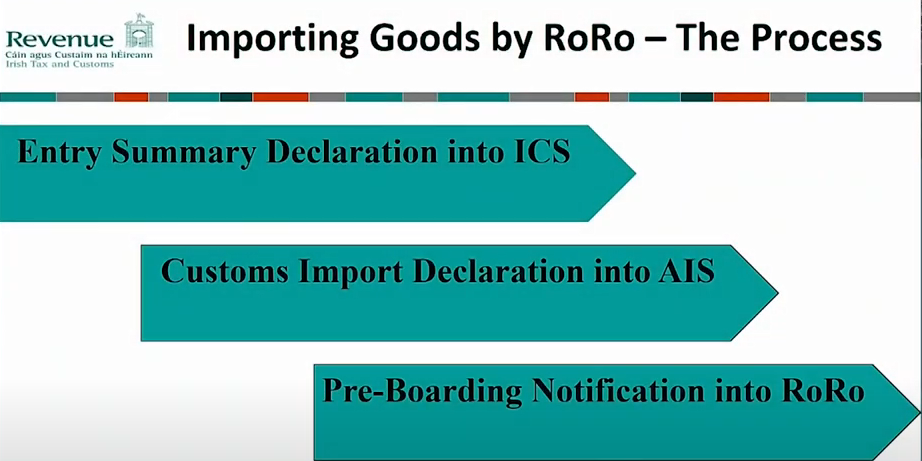So what is a Pre Boarding Notification (PBN) ?
A Pre Boarding Notification (PBN) enables customs to provide one single instruction to be followed by the driver on arrival at an Irish port. It ensures speedy and accurate channeling of a vehicle or truck through the port. It is basically an envelope that contains customs documentation references and details of all goods in a consignment carried by RoRo transport. It is designed to facilitate the ‘just in time’ RoRo system.
PBNs are created online at Revenues RoRo Service Online website. Any party in the logistics supply chain can create the PBN. Usefully, a PBN can be updated with additional data after it is initially created (example with another required MRN).
The Pre Boarding Notification (PBN) must contain all of the details of all customs declarations for all goods carried on the vehicle or truck. These include for example all MRNs (Movement Reference Numbers) created in customs declarations pertaining to the consignment (example; Import Declaration MRN and ENS (Security) declaration MRN.)
For imports from the UK all customs declarations should be made in advance of arrival at the port of departure in the UK. If the goods are to successfully board the ferry in the UK the driver of the vehicle must have a ‘valid’ PBN.
The driver presents the PBN at the UK port. The UK port checks the PBN’s status and if valid and the status is “Good to Check In” then the driver will be allowed to board the ferry.
The driver can check the status any time online through a smartphone or other devise. All that is required is the PBN unique ID. Checking before getting to the port is wise and can prevent issues at the port.
Once on the ferry, all PBNs (and some other information) are sent by the ferry operator to Revenue. This alerts Revenue of exactly what is arriving on the ferry and Revenue can check all goods documents in advance of arrival.
Each vehicle has on unique PBN which identifies all of the goods onboard, even if goods are being transported together from different exporters. This identification of individual goods by Revenue can occur as the PBN ‘envelope’ contains the details, ( seen through the different MRNs ), of each import declaration made by each Irish importer.
A PBN is required for Inbound and Outbound journeys.
The PBN allows Revenue in Ireland to see what goods are contained within the shipment and can deal with routing while the goods are on route to Ireland, finishing, as much as possible customs requirements before they land in the port.
This allow for faster channeling of trucks through customs at the port. Drivers are communicated with via text and advised on which channel to use at the port. If the goods are green routed by Revenue the driver can exit the port quickly and directly. If the goods are orange routed, Revenue will have notified the parties of the routing while the goods are in transit on the ferry, and, if required documentation is received by Revenue and processed before the goods land, the routing will be changed to green and goods can clear the port easily.
Where goods are red routed for customs check, the driver is notified of which channel to take on ferry disembarkation. Channels are also set for other purposes including Live Animals, Transit, Seal Check, and Customs Check.
If a driver misses the ferry the same PBN can be used when boarding a later ferry (note however, the import declaration itself should be updated).
Businesses will need to consider who will complete the Pre-Boarding Notification as this may not necessarily be the same person that lodges the customs declarations. A business should work closely with its logistics provider or haulier to ascertain what will work best for them both.
The fundamental lesson in terms of Pre Boarding Notification (PBN) usage is that all parties in the logistics chain should share information as soon as they have it.
As part of their Customs Brexit Information Seminar, Revenue made the following presentation and question & answer session on what a PBN is, who can create a PBN and where.








